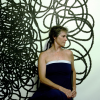Home » Jazz Articles » Album Review » Matthew Shipp Trio: Harmonic Disorder
Matthew Shipp Trio: Harmonic Disorder
Shipp plunges his fingers immediately into a repetitive configuration of notes, as Bassist Joe Morris corresponds with a simple mid-range pizzicato and Whit Dickey, a hi-hat and brush to snare clip. Without pause, the trio starts to traverse miles of musical lines. Apparent in this trio recording is the brevity of each piece, nonetheless replete with the changing rhythmic configurations, continual motion and straightforwardness that brands Shipp.
The lines vary from the identifiably melodic to the abstruse. Shipp's tendency to take apart thematic content, stress its fundamentals and put it back together predominates on "There Will Never Be Another You" and "Zo Number 2." He stretches the limits on how far tunefulness can be pushed, always sustaining its clarity through his intuitive logic. Furthermore, the integration of chords and note progressions weaves a substantial surface that varies topographically from fast ("Zo Number 2") to slow ("Quantum Waves"); from gestural ("Orb," "Compost,") to fluid ("Compost," "Some Day My Prince Will Come"); or from swinging ("GNG," "Light") to disarrayed ("Mr. JM"). The change in the surface makes listening just as much an adventure as making the music might be.
More than band mates, Morris and Dickey extend the power of the notes Shipp plays. How to spin off the sounds from the piano challenges creation; knowing how to support it requires sensitivity. Shipp's playing is relentless, even when it questions and becomes a blues of sorts ("Harmonic Disorder"). Morris's response can be a pizzicato that echoes the dynamic motion of the piano keys, just a tad off-center, within the absorption of the reverb of the bass strings. Dickey's response can be quiet circular brushwork on the snare with the clip of the hi-hat here and there ("Orb"). Yet, concurrently with Shipp, Morris and Dickey can fall into a thorough groove, walking the bass line or understatedly snapping out regular pulse figures that involve both the drum skins and the cymbals ("Roe," "Light"). Uniquely, on "Quantum Waves," Morris rips the bass strings with the bow, exaggerating Shipp's key to key bass to mid-range scalar runs interspersed with attacks on the piano sounding board, while Dickey maintains a subdued percussiveness, thumping on the skins both with hands and sticks.
Nothing less than the deepest tones of the bass, a continuous roll on the snare, and Shipp's inescapable bass chord ostinatos can emphasize any more clearly the reason for the necessity of music in human lifetimes ("When The Curtain Falls On The Jazz Theater"). For it is music that can offer harmony in a universe that is perpetually, irreversibly falling towards disorder.
Track Listing
GNG; There Will Never Be Another You; Harmonic Disorder; Someday My Prince Will Come; Mel Chi 2; Mr. JM; Mel Chi 1; Roe; Orb; Compost; Zo Number 2; Quantum Waves; Light; When the Curtain Falls on the Jazz Theater.
Personnel
Matthew Shipp
pianoMatthew Shipp: piano; Joe Morris: bass; Whit Dickey: drums.
Album information
Title: Harmonic Disorder | Year Released: 2009 | Record Label: Thirsty Ear Recordings
< Previous
Bud Shank: Never at a Standstill
Next >
Eye of the Beholder
Comments
Tags
Concerts
For the Love of Jazz
 All About Jazz has been a pillar of jazz since 1995, championing it as an art form and, more importantly, supporting the musicians who create it. Our enduring commitment has made "AAJ" one of the most culturally important websites of its kind, read by hundreds of thousands of fans, musicians and industry figures every month.
All About Jazz has been a pillar of jazz since 1995, championing it as an art form and, more importantly, supporting the musicians who create it. Our enduring commitment has made "AAJ" one of the most culturally important websites of its kind, read by hundreds of thousands of fans, musicians and industry figures every month.




















